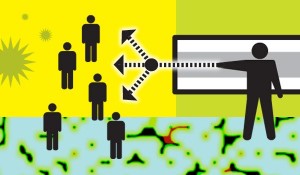 Since I deal in frustration, stress, and struggle, I’m frequently engaged by leaders to work my magic on their teams. The problem, these leaders often suggest, is that people have a hard time listening. They make the same mistakes repeatedly, or don’t communicate well with the team. They are the source of the boss’s frustration, stress, and struggle, and my job is to change them. But what’s the one thing all these people who cause so many issues have in common? Their leader!
Since I deal in frustration, stress, and struggle, I’m frequently engaged by leaders to work my magic on their teams. The problem, these leaders often suggest, is that people have a hard time listening. They make the same mistakes repeatedly, or don’t communicate well with the team. They are the source of the boss’s frustration, stress, and struggle, and my job is to change them. But what’s the one thing all these people who cause so many issues have in common? Their leader!
Now I have several clients and past clients who read this newsletter, and please know that I’m not talking about all of you. It is not uncommon, however, for me to hear about Sally who just can’t seem to get all her work done in 40 hours a week. Or Martin who agrees to get something done, but somehow never gets around to it. Or the “games people play” politically in an organization.
What can I say? It starts at the top. The unifying link is the boss. For those of you who are the boss and are experiencing some of these issues, this is good news, because it means that the one person who can effect the most positive change is you.
Changing the Dynamic
I’ve frequently referred to the Hawaiian affirmation, Ho’oponopono. Ho’oponopono’s message is that we are all responsible for everything. Spiritually, the Hawaiian shamans (and Buddhists and others) believe that we are all connected…not only humans, but all living things. When we interact, we affect everything in the universe.
If we believe this, then it becomes our responsibility to interact with everyone and everything in a universally productive manner. (Karma’s a bitch.) If we expect a problem with a direct report, then we, in essence, create that response. To be productive, we change our expectation and say the affirmation:
I love you.
I am sorry.
Please forgive me.
Thank you.
In simple English, we are asking the other party to forgive us for harboring the belief that he or she can or will fail us.
Now I’m not suggesting we just think happy thoughts about everybody and all the frustration, stress, and struggle will evaporate (although I suspect it would help). I am suggesting that neutralizing a nonproductive forethought gives us a better chance of creating a successful outcome. And if, as Ho’oponopono suggests, we create and are responsible for an outcome by imagining that outcome, think of the power we have over fate. Think of how we can change our interpersonal environments.
You probably have many counterproductive tapes that you replay with people close to you in your office, family, or rally team. What if you took those repeated interactions and just thought:
I love you.
I’m sorry (for preparing for the same old bullshit debate we’ve had forever).
Please forgive me (for thinking in the past that you’ll do what you’ve always done, so you don’t have to do it this time).
Thank you (assuming you are forgiven).
This powerful affirmation can keep both of you from playing your repetitive roles in your game of struggle.
I remember an interview with a leader many years ago. She lamented that she had challenges getting people to do what she felt they had agreed to do. “Who?” I asked. “My direct report, for one. Oh, and my husband. And my daughter. And my assistant at the charity I work with.”
I simply asked: “See any common thread?”
She did not. Her Knower/Judger insisted on maintaining her prediction that people close to her would fail her. This made her right, which was important to her. It’s a common thing. We are often blind to our own prejudices and limitations. In fact, Pogo could be right: “We have met the enemy and he is us.
So you’ve got frustration, stress, and struggle? Maybe the source is not “out there.” Maybe it’s “in here.”
